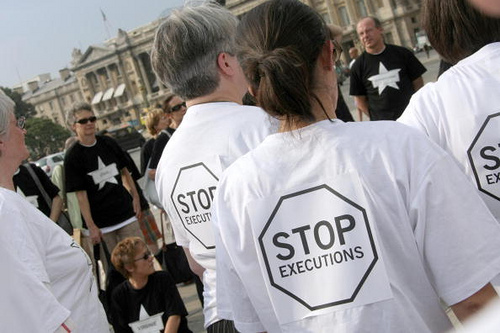9th October 2013 Cape Town, South Africa
World Day against the Death Penalty

The following is a guest post by Laura Clarke, Political Counsellor.
10 October is World Day against the Death Penalty. Since 2003, people all over the world have, on this day, been making clear their opposition to this form of punishment. Like many people who live in countries which, like South Africa and the UK, have abolished the death penalty, I don’t actually think about it that often.

But today is a day to reflect on how far we have come, internationally, and how much more there is to do to promote worldwide abolition of the death penalty.
Living and working in South Africa, I’ve come to understand South Africa’s particularly painful experience of the death penalty. The apartheid government performed 2,949 hangings between 1959 and 1989, of which 1,123 happened in the 1980s, at the height of the struggle against apartheid. 164 people were executed in 1987 alone.
It’s hard to think of those numbers in terms of individuals, but the personal stories brings home the tragedy of it all: for example I recently watched the film Amandla!, which tells the story of Vuyusili Mini, a composer and activist who was hanged in 1964 for his protest songs. The end of apartheid meant the end of the death penalty.
Capital punishment was abolished in South Africa in June 1995, by ruling of the Constitutional Court, and South Africa’s Bill of Rights guarantees the right to life.
The UK Government shares South Africa’s belief, enshrined in the Bill of Rights, that the death penalty has no place in the modern world. We believe that it undermines human dignity, and see no conclusive evidence of its deterrent value. And any miscarriage of justice leading to the death penalty is irreversible and irreparable.
I think this last point resonates particularly in the UK: following the executions of Timothy Evans and Derek Bentley in the 1950s, the state admitted that mistakes had been made at both men’s trials, and both were pardoned posthumously. These cases persuaded Parliament to act to restrict the use of the death penalty.
The last execution in the UK was in 1964, and in 1998, Parliament formally abolished the death penalty for all crimes.
The worldwide abolition of the death penalty is an important goal in our foreign policy. South Africa and the UK were two of the 111 states who, at the UN in December 2011, voted in favour of a worldwide moratorium on executions. This was the greatest vote yet against the death penalty – but there is still a way to go.
I understand from Amnesty International that 21 countries applied the death penalty in 2012, and experts estimate that 3,600 executions took place across the world. The majority of these are in China, followed, in terms of numbers, by Iran, Iraq and Saudi Arabia.
The UK works closely with EU and other like-minded partners, such as South Africa, to gain support for abolition of the death penalty, or at least a moratorium on its use.
I believe that South Africa’s own history gives it a particular moral authority, in Africa and beyond, which individuals like Archbishop Tutu have used to good effect in lobbying countries that maintain the death penalty. And with influential figures such as Nkosozana Dlamini-Zuma as AU Commission Chair, and Navi Pillay as UN High Commissioner for Human Rights, South Africa has great influence on the global stage, and a huge amount to contribute to this vital campaign.